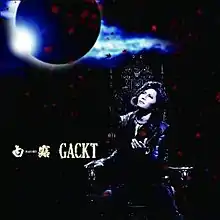Hakuro (song)
"Hakuro" (白露-Hakuro-, lit. "White Dew") is the forty-second single of Japanese solo artist Gackt, released on October 10, 2012.[1] It is the theme song for the drama Sengoku Basara.[2][3] The title song was simultaneously released in Europe by Gan-Shin as a digital download on Amazon and other sites, but is not available on iTunes.[4]
| "Hakuro" | ||||
|---|---|---|---|---|
 CD only cover | ||||
| Single by Gackt | ||||
| B-side | "Jounetsu no Inazuma" | |||
| Released | October 10, 2012 | |||
| Recorded | 2012 | |||
| Genre | Symphonic rock | |||
| Length | 4:08 | |||
| Label | Avex Trax, Gan-Shin (EU) | |||
| Songwriter(s) | Gackt C. | |||
| Producer(s) | Gackt | |||
| Gackt singles chronology | ||||
| ||||
Track listings and formats
All tracks are written by Gackt C
| No. | Title | Length |
|---|---|---|
| 1. | "Hakuro (白露-Hakuro-, White Dew) [nb 1] - 4:08" | 4:08 |
| 2. | "Jounetsu no Inazuma (情熱のイナズマ, Inazuma's Passion)" | 3:58 |
| 3. | "Hakuro (Instrumental)" | |
| 4. | "Jounetsu no Inazuma (Instrumental)" |
| No. | Title | Length |
|---|---|---|
| 1. | "Hakuro (Music Film)" |
Notes
- "Hakuro" in rōmaji, or "Báilù" in (pīnyīn), literally meaning "white dew", is the 15th solar term of East Asian calendar, in the Gregorian calendar usually begins on 7th September and ends around 23rd September.[5]
Charts
- Oricon
| Release | Provider(s) | Chart | Peak position | Sales total |
|---|---|---|---|---|
| October 10, 2012 | Oricon | Weekly Singles | 6[1] | 13,192 |
| Monthly Singles | 30 | 16,214 | ||
- Billboard Japan
| Chart (2012) | Peak position |
|---|---|
| Billboard Japan Hot 100[6] | 12 |
References
- ""Hakuro" on Oricon" (in Japanese). Oricon. Retrieved December 10, 2015.
- "「戦国Basara」が実写ドラマ化!伊達政宗は林遣都、織田信長はGackt!" (in Japanese). Cinematoday. 2012-06-16. Retrieved July 16, 2014.
- "Gackt、信長役で出演中ドラマ「戦 国Basara」ED曲発売". natalie.mu (in Japanese). Natasha. 2012-08-14. Retrieved August 14, 2012.
- "New single from Gackt – Hakuro". Japan Underground / JPU Records. 2012-10-09. Retrieved July 16, 2014.
- "24 Solar Terms: 8 things you may not know about White Dew". China Daily. 2018-09-08. Retrieved 2019-03-05.
- ""Hakuro" on Japan Hot 100 chart". Billboard Japan. Retrieved December 10, 2015.
This article is issued from Wikipedia. The text is licensed under Creative Commons - Attribution - Sharealike. Additional terms may apply for the media files.